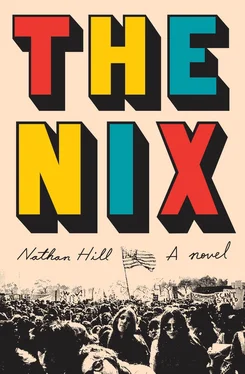“Samuel?” she says, and he spins around.
How much do people change in just a few years? Samuel’s first impression — and this is the best way he could explain it — is that she looks more real. She is no longer glowing with his fantasies about her. She looks like herself, in other words, like a normal person. Maybe she hasn’t changed at all, but the context has. She still has the same green eyes, the same pale skin, the same perfectly erect posture that has always made Samuel feel a little slumpy. But there is something different about her, the way her face has creased about the eyes and mouth that does not suggest time or age but rather emotion, experience, heartache, wisdom. It’s one of those things he recognizes in a blink but could not point out specifically.
“Bethany,” he says, and they hug, stiffly, almost ceremonially, like how you might hug someone you used to work with.
“It’s good to see you,” she says.
“You too.”
And because she probably doesn’t know what to say next, she looks around the room and says, “Quite a place, isn’t it?”
“Quite a place. Quite a collection.”
“Very pretty.”
“Beautiful.”
They spend a useless moment staring at the room, looking at everything but each other. Panic surges up in Samuel — have they already run out of things to say? But then Bethany breaks the silence: “I’ve always wondered how much joy all this stuff really brought him.”
“What do you mean?”
“He has the big names — Mozart, Milton, Keats. But there’s no evidence of real fire. It’s always struck me as an investor’s collection. He’s building a diverse portfolio. It doesn’t say love.”
“Maybe there were a few pieces he loved. He hid them from everyone else. They were only his.”
“Maybe. Or maybe that’s even sadder, that he couldn’t share them.”
“You wanted to show me something?”
“This way.”
She leads him to a corner where, displayed under glass, are several handwritten musical scores. Bethany points to one: the Violin Concerto no. 1, by Max Bruch, written in 1866.
“The first concert you heard me play, I played this,” Bethany says. “Do you remember?”
“Of course.”
The yellowed manuscript pages look like chaos to Samuel, and not because he doesn’t read music. Words have been written and then scribbled over, notes have been erased or x-ed out, there seems to be a first layer of pencil under the ink, and stains on the pages from what might be coffee or paint. The composer had written allegro molto at the top, but then crossed out molto and replaced it with moderato. The title of the first movement, Vorspiel, is followed by a lengthy subtitle that extends more than half the page and is completely obscured by squiggles and lines and doodles.
“That’s my part,” Bethany says, pointing at a clump of notes that seem barely contained by the five-line staff underneath. How this mess could turn into the music Samuel heard that night seems like a miracle.
“Did you know he was never paid for this?” Samuel says. “He sold the score to a couple of Americans, but they never paid him. He died poor, I think.”
“How do you know that?”
“Something my mother told me. At your concert, actually.”
“You remember that?”
“Very well.”
Bethany nods. She doesn’t press.
“So,” she says, “what’s new with you?”
“I’m about to be fired,” he says. “What’s new with you?”
“Divorced,” she says, and they both smile at this. And the smile grows into a laugh. And the laughing seems to melt something between them, a formality, a guardedness. They are together with their disasters, it turns out, and over lunch at the museum’s restaurant she tells him about her four-year marriage to Peter Atchison, how by year two she’d begun saying yes to every international gig offered to her so she wouldn’t be in the same country as Peter and therefore did not have to acknowledge what had been plain to her from the beginning: that she was very fond of him but did not love him, or if she did love him she did not love him in that particular way that sustains the years. They were good to each other, but they were never passionate. In their final year of marriage she was finishing a monthlong tour of China and dreaded going home.
“That’s when I finally had to end it,” she says. “I should have done it much earlier.” She points her fork at him. “If only you hadn’t left that night.”
“I’m sorry,” Samuel says. “I should have stayed.”
“No, it’s good you left. That night, I was looking for an easy way out. But the hard way out was better, ultimately, for me, I think.”
And he tells her all about his recent upheaval, beginning with his mother’s odd reappearance—“The Packer Attacker is your mom ?” Bethany says, which draws looks from other tables — and the police and the judge, all the way up to today’s meeting with Periwinkle and Samuel’s current dilemma involving the ghostwritten book.
“Listen,” he says, “I think I want to start over.”
“With what?”
“With my life. My career. I think I want to burn it all down. Reset it completely. The thought of going back to Chicago is unbearable. These last few years have been one long rut I need to get out of.”
“Good,” Bethany says. “I think that’s good.”
“And I know it’s forward of me and presumptuous and really unexpected and all, but I was hoping you could help. I was hoping to ask you a favor.”
“Of course. What do you need?”
“A place to stay.”
She smiles.
“Just for a little while,” he adds. “Till I figure a few things out.”
“Conveniently,” she says, “my apartment has eight bedrooms.”
“I’ll stay out of your hair. You won’t even notice me. I promise.”
“Peter and I lived there and never saw each other. It is definitely possible.”
“Are you sure?”
“Stay as long as you need.”
“Thank you.”
They finish lunch and Bethany has to leave for her second rehearsal of the day. They hug again, this time tightly, as intimates, as friends. Samuel lingers for a while at the Bruch manuscript, studying its messy pages. It makes him happy that even the masters have false starts, even the greats must sometimes double back. He imagines the composer after he’d sent this manuscript abroad, imagines how it must have felt when he no longer had the music but only had his memory of it. The memory of making it, and the way it would sound when it was played. His money would have been drying up, and war was breaking out, and all he had at the end was his imagination and maybe a fantasy of what his life would have been like had things turned out differently, how his music would have filled the spaces of cathedrals on brighter days.
THE HEADLINE APPEARS one morning from the Bureau of Labor Statistics: UNEMPLOYMENT UNCHANGED.
Television news picks it up moments later, cutting into programming to deliver the startling report: Over the last month, the economy has added no new jobs.
It’s the biggest story of the day. It is hard data that seems to crystallize this ambiguous, uncomfortable feeling people are having in the autumn of 2011, which is that the world is galloping toward ruin. Whole island nations are going bankrupt. The European Union is pretty much insolvent. Brand-name banks have been suddenly liquidated. The stock market crashed this summer, and most experts say it’ll continue tumbling well into winter. The word on the street is “deleveraging”—everyone owes too much. The world, it turns out, has way more stuff than the world has the money to own. Austerity is very hip right now. So is gold. Money pours into the gold markets because things have gotten so bad people are questioning the very philosophical legitimacy of paper money. Certain views that paper money is a hoax propped up by a collective fantasy move from the fringes and gain traction in mainstream conversation. The economy has turned medieval, the only treasure now being actual treasure —gold, silver, copper, bronze.
Читать дальше












